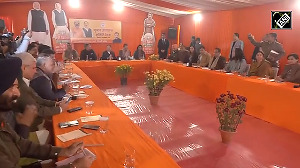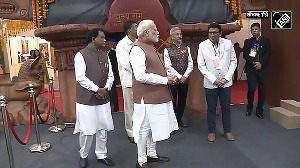Jamaat-ud-Dawah chief Hafiz Muhammad Saeed may face fresh detention after British diplomats met senior Pakistani officials to convince them to crack down on the organisation, a front for the banned Lashkar-e-Tayiba, according to a media report on Monday.
Diplomats from the British missions in Islamabad and New Delhi had a "successful rounds of talks with Pakistani leaders in the last week of July", The Express Tribune newspaper quoted unnamed diplomats as saying.
These talks "might lead to the detention of JuD chief Hafiz Muhammad Saeed and a possible crackdown on his group", the report said without giving details.
The report contended that the developments were an outcome of a "covert diplomatic campaign" by India to pressure Pakistan to rein in the JuD, which New Delhi has blamed for the 2008 Mumbai terrorist attacks.
The report quoted the diplomats as saying that the British government hopes to convince Pakistan to address India's concern about Saeed and restrict the activities of the JuD in Pakistan and Jammu and Kashmir.
Pakistani authorities had launched a limited crackdown on the JuD and its leaders in the aftermath of the Mumbai attacks after the United Nations Security Council classified the group as a front for the LeT.
However, no official notification was issued to ban the JuD and most of its detained leaders, including Saeed, were freed within months.
Though peace talks between India and Pakistan resumed in February after a gap of over two years, New Delhi has insisted that Islamabad should do more to bring to justice the planners, facilitators and financiers of the Mumbai attacks.
Pakistan acknowledged that the attacks were plotted and launched from its soil and put seven suspects, including LeT commander Zakiur Rehman Lakhvi, on trial on charges of involvement in the Mumbai incident.
However, little headway has been made in the trial. Twenty other suspects linked to the attack continue to be at large.
The British government has reservations about JuD activities and the "soft corner" of the Pakistan Muslim League-Nawaz government in Punjab province for outlawed groups like Sipah-e-Sahaba Pakistan and Lashkar-e-Jhangvi, the daily reported.
In July, the Punjab government released LeJ founder Malik Muhammad Ishaq, the self-confessed killer of over 70 people, mostly Shias. The move had invited criticism from home and abroad.








 © 2025 Rediff.com -
© 2025 Rediff.com -